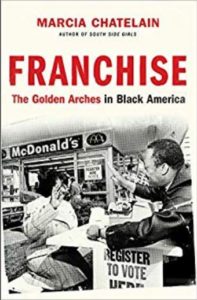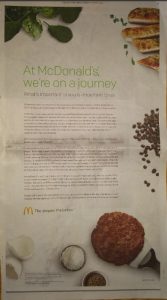Weekend reading: McDonald’s in Black America
Marcia Chatelain. Franchise: The Golden Arches in Black America. Liveright, 2020.

I did a blurb for this book, and was happy to do it:
Marcia Chatelain uses the complex interrelationship of black communities with McDonald’s to explore the history of American racism and the struggle for civil rights. Franchise is an eye-opener for anyone who cares about why diet-related chronic disease is more prevalent in these communities and what it is really like to be black in America.
Here are a few selected excerpts to give you the idea:
The contemporary health crisis among black America—like all of our society’s most pressing problems—has a history. By unmasking the process of how fast food “became black,” we are able to appreciate the difficult decisions black America has had to make under the stress of racial trauma, political exclusion, and social alienation. This story is about how capitalism can unify cohorts to serve its interests, even as it dissembles communities…Ultimately, history encourages us to be more compassionate toward individuals navigating few choices, and history cautions us to be far more critical of the institutions and structures that have the power to take choices away (p. 23).
To ignore the positive impacts of franchise networks among communities of color that appreciate their contributions would be shortsighted. It is equally shortsighted to ignore the government subsidies, civil right organization endorsements, limited community resources, and economic desperation that supports the dubious idea that fast food—and business on the whole—can breathe life into an underdeveloped community (p. 253).
The idea of financially sound black institutions is alluring across the ideological spectrum because it allows white conservatives and liberals alike to claim plausible deniability in their role in supporting systems and politics that maintain racial capitalism (p. 260).
This book is concerned with the reasons that places like Ferguson are more likely to get a fast food restaurant than direct cash aid to the poor, oversight over the police department, or jobs that pay more than $8.60 per hour (p. 263).
This book was reviewed in the New York Times:
“Franchise” is a serious work of history….“History encourages us to be more compassionate toward individuals navigating few choices,” Chatelain writes, “and history cautions us to be far more critical of the institutions and structures that have the power to take choices away.”







